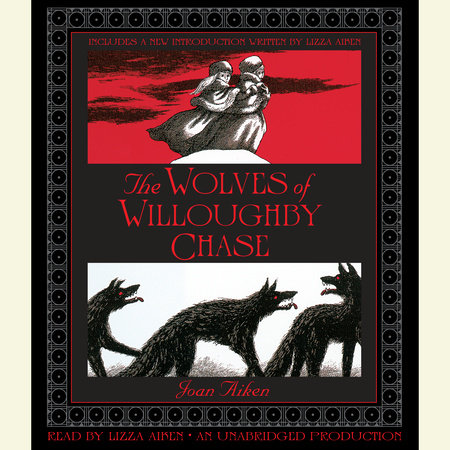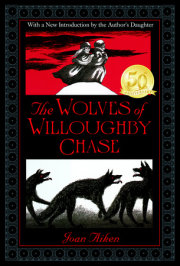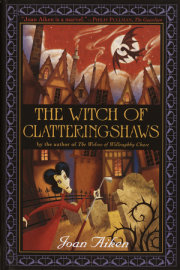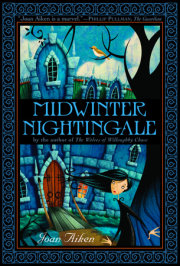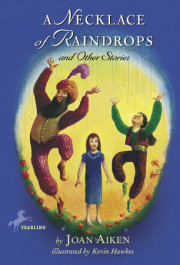It was dusk--winter dusk. Snow lay white and shining over the pleated hills, and icicles hung from the forest trees. Snow lay piled on the dark road across Willoughby Wold, but from dawn men had been clearing it with brooms and shovels. There were hundreds of them at work, wrapped in sacking because of the bitter cold, and keeping together in groups for fear of the wolves, grown savage and reckless from hunger.
Snow lay thick, too, upon the roof of Willoughby Chase, the great house that stood on an open eminence in the heart of the wold. But for all that, the Chase looked an inviting home--a warm and welcoming stronghold. Its rosy herringbone brick was bright and well-cared-for, its numerous turrets and battlements stood up sharp against the sky, and the crenelated balconies, corniced with snow, each held a golden square of window. The house was all alight within, and the joyous hubbub of its activity contrasted with the somber sighing of the wind and the hideous howling of the wolves without.
In the nursery a little girl was impatiently dancing up and down before the great window, fourteen feet high, which faced out over the park and commanded the long black expanse of road.
"Will she be here soon, Pattern? Will she?" was her continual cry.
"We shall hear soon enough, I dare say, Miss Bonnie," was the inevitable reply from her maid, who, on hands and knees in front of the fire, was folding and goffering the frills of twenty lace petticoats.
The little girl turned again to her impatient vigil. She had climbed up on to the window seat, the better to survey the snowy park, and was jumping on its well-sprung cushions, covered in crimson satin. Each time she bounced, she nearly hit the ceiling.
"Give over, Miss Bonnie, do," said Pattern after a while. "Look at the dust you're raising. I can hardly see my tongs. Come and sit by the fire. We shall hear soon enough when the train's due."
Bonnie left her perch reluctantly enough and came to sit by the fire. She was a slender creature, small for her age, but rosy-cheeked, with a mass of tumbled black locks falling to her shoulders, and two brilliant blue eyes, equally ready to dance with laughter or flash with indignation. Her square chin also gave promise of a powerful and obstinate temper, not always perfectly controlled. But her mouth was sweet, and she could be very thoughtful on occasion--as now, when she sat gazing into the fire, piled high on its two carved alabaster wolfhounds.
"I hope the train hasn't been delayed by wolves," she said presently.
"Nonsense, Miss Bonnie dear--don't worry your pretty head with thoughts like that," replied Pattern. "You know the porters and stationmaster have been practicing with their muskets and fowling pieces all the week."
At that moment there was a commotion from downstairs, and Bonnie turned, her face alight with expectancy. As the noise of dogs barking, men shouting, and the doorbell clanging continued, she flew recklessly along the huge expanse of nursery floor, gleaming and polished as glass, and down the main staircase to the entrance hall. Her impetuosity brought her in a heap to the feet of an immensely tall, thin lady, clad from neck to toe in a traveling dress of swathed gray twill, with a stiff collar, dark glasses, and dull green buttoned boots. Bonnie's headlong rush nearly sent this person flying, and she recovered her balance with an exclamation of annoyance.
"Who is guilty of this unmannerly irruption?" she said, settling her glasses once more upon her nose. "Can this hoydenish creature be my new pupil?"
"I--I beg your pardon!" Bonnie exclaimed, picking herself up.
"So I should hope! Am I right in supposing that you are Miss Green? I am Miss Slighcarp, your new governess. I am also your fourth cousin, once removed," the lady added haughtily, as if she found the removal hardly sufficient.
"Oh," Bonnie stammered, "I didn't know--that is, I thought you were not expected until tomorrow. I was looking for my cousin Sylvia, who is arriving this evening."
"I am aware of the fact," Miss Slighcarp replied coldly, "but that does not excuse bad manners. Where, pray, is your curtsy?"
Rather flustered, Bonnie performed this formality with less than her usual grace.
"Lessons in deportment, I see, will need priority on our timetable," Miss Slighcarp remarked, and she turned to look after the disposition of her luggage. "You, sir! Do not stand there smirking and dawdling, but see that my valises are carried at once to my apartments, and that my maid is immediately in attendance to help me."
James, the footman, who had been exchanging grimaces with the butler over the fact that he received no tip, at once sprang to attention, and said:
"Your maid, miss? Did you bring a maid with you?"
"No, blockhead. The maid whom Lady Green will have appointed to wait on me."
"Well, I suppose Miss Pattern will be helping you," said James, scratching his head, and he shouldered one of the nine walrus-hide portmanteaux and staggered off to the service stairs.
"I will show you the way to your room," said Bonnie eagerly, "and when you are ready I will take you to see Papa and Mamma. I hope we shall love each other," she continued, leading the way up the magnificent marble staircase, and along the portrait gallery. "I shall have so much to show you--my collection of flint arrowheads and my semiprecious stones."
Miss Slighcarp thinned her lips disapprovingly and Bonnie, fearing that she had been forward, said no more of her pursuits.
"Here is your apartment," she explained presently, opening a door and exhibiting a commodious set of rooms, cheerful with fires and furnished with elegant taste in gilt and mahogany. "And here is my maid Pattern to help you."
Miss Slighcarp drew down her brows at this, but acknowledged the remark by an inclination of her head. Pattern was already kneeling at the dressing case and drawing out such articles as the governess might immediately need.
Copyright © 1987 by Joan Aiken. All rights reserved. No part of this excerpt may be reproduced or reprinted without permission in writing from the publisher.

